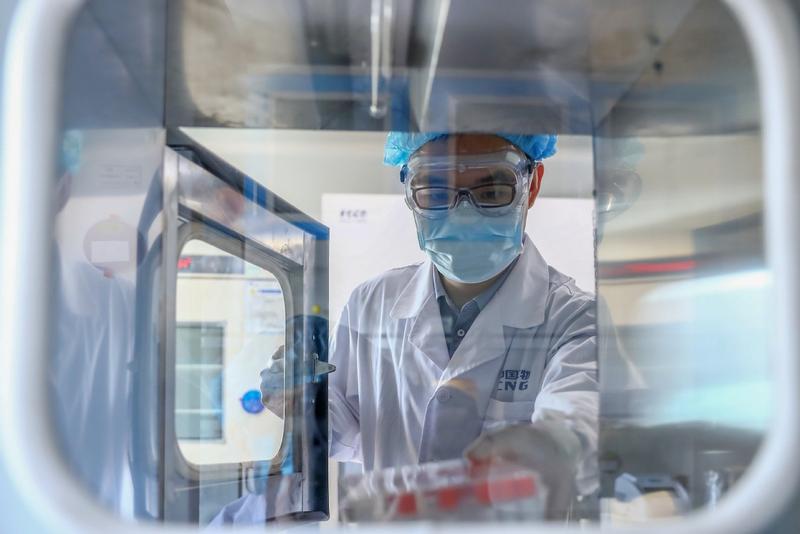 An employee handles trial vaccine samples at a COVID-19 vaccine production base of Sinopharm in Beijing. (PHOTO / XINHUA)
An employee handles trial vaccine samples at a COVID-19 vaccine production base of Sinopharm in Beijing. (PHOTO / XINHUA)
At Beijing Institute of Biological Products Co Ltd, an employee puts on protective clothing, an N95 mask and protective goggles, goes through several disinfection procedures, and enters a negative pressure workshop. In the workshop, an inactivated vaccine targeting COVID-19 is being produced and inspected.
According to the owner of the institute, China National Biotech Group Co Ltd, Sinopharm's vaccine and bioscience unit, the phase-2 human trials of its inactivated vaccine at the Beijing Institute, as well as the Wuhan Institute of Biological Products, are under way, and more than 2,000 volunteers have been vaccinated.
Clinical data showed the safety and effectiveness of the vaccine were tested and the vaccine's incidence rate and degree of adverse reactions were much lower than the various other vaccines on the market.
The company said that there are in total three phases of clinical trials. Once the inactivated vaccine completes the three trials, it is expected to hit the market by the end of this year or the beginning of next year.
The world is racing to develop COVID-19 vaccines, yet it is not a competition between countries, but rather a race between humans and the virus
ALSO READ: Vaccine goal ‘tailor-made’ for China
Liu Jingzhen, president of Sinopharm, said that currently, the batch output of the workshop at the Beijing Institute surpassed 3 million doses, and after the mass production started on May 30, the yearly output can reach 100 million to 120 million doses.
Along with the production at the Wuhan Institute, the total yearly output can reach 200 million doses, fully guaranteeing the accessibility of the inactivated vaccine, he said.
On April 24, CNBG launched phase-2 human trials of its first inactivated vaccine, which is codeveloped by the Wuhan Institute of Biological Products and the Wuhan Institute of Virology under the Chinese Academy of Sciences.
The product, which got approval for clinical trials on April 12, was the first inactivated vaccine worldwide to reach such a developed approval stage. The National Medical Products Administration authorized its phase-1 and phase-2 human trials at the same time on that day through a fast-track channel based on solid results from preclinical trial studies.
On April 27, CNBG's second inactivated vaccine for COVID-19 was approved by the NMPA. The vaccine is codeveloped by Beijing Institute of Biological Products and the Chinese Center for Disease Control and Prevention.
Yang Xiaoming, president of CNBG, said that currently, there are more than 100 research institutions worldwide working on vaccines targeting COVID-19, and the vaccines can be classified into roughly five types-inactivated vaccine, gene recombinant vaccine, adenovirus vaccine, viral vector vaccine, and nucleic acid vaccine. As CNBG is experienced in inactivated vaccines and has various related marketed products, the company chose to work on an inactivated vaccine.
He said that in terms of the research and development of COVID-19 vaccines, China is sparing no efforts to be one of the top players in the world.
"The world is racing to develop COVID-19 vaccines, yet it is not a competition between countries, but rather a race between humans and the virus," he said.
READ MORE: China's COVID-19 vaccine may begin mass output this year
Chen Qiaoshan, a medical analyst at Beijing-based market consultancy Analysys, said that China has a relatively mature research and development foundation for vaccine production, and the reason why China is among the first-tier nations this time is that it conducted strain isolation and started R&D at an early stage.
In addition, the government has been very supportive during the process. It has simplified the approval process and opened green channels for vaccines, she said.
Yang said that the difficulties for the vaccine R&D lie in the fact that the virus is relatively new, and many of its characteristics, such as infectiousness and lethality, are unknown. The company made stellar technological efforts and invested over 5 billion yuan (US$702 million), working round the clock to study the virus, he said.


